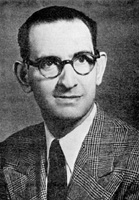Henry V. Besso Z"L
1905 -1993
"Teacher, writer, lecturer, researcher and bibliographer - a scholar who had dedicated his life to the pursuit of Sephardic studies."Henry V. Besso was born in Salonica, and received his early education at the Salonica Altshek Institute de Commerce, and at the College St. Jean Baptiste de la Salle. After the death of both parents, young Henry followed his older brother to New York City. Here he found work with an import-export firm, quickly becoming the assistant manager in charge of exports to Latin America, Spain and the Philippines.
While a commercial career helped Besso provide a comfortable living for his wife and son, it did not satisfy his craving for knowledge. While he worked during the days, he attended evening classes and studied late into the night, earning his B.A. degree from New York City College in 1931, and his M.A. from Columbia University Graduate School in 1935.
His firm closed during the Depression, and Besso qualified for a position in the federal project called WPA (Works Progress Administration). He was placed in the New York Adult Education Program, teaching French and Spanish, but was soon supervising and training other teachers. In 1940, he was transferred to Washington, DC to train Air Force and Naval officers as well as US government officials, in preparation for their special overseas missions. This assignment led to his becoming a research analyst and speechwriter for the Voice of America (VOA), and for decades he was to connected with that federal organization in its Washington offices.
Immediately after WWII, Besso was sent to Europe to again instruct military personnel in French and Spanish. While abroad he was invited to lecture at a number of universities in France and in Spain, and his writing in the field of Hispanic and Judeo-Spanish linguistics, history and culture made him a well known in academic circles in his field. In his later years, his extensive scholarly contributions were acknowledged by the Instituto Arias Montano of Madrid, and the Hispanic Institute of Columbia University, and he received several scholarly honors. In 1963, he researched, edited and published a listing of 289 Judeo-Spanish works he uncovered at the Library of Congress in Washington, DC. To this day, his work, Ladino Books in the Library of Congress - A Bibliography, is still considered one of the definitive bibliographic listings of the world's great collections of Judeo-Spanish literature.
As important as Sephardic scholarship and studies was to Besso, he also took part in its communal life. For many years, Besso was an active member of the Sephardic Jewish Brotherhood of America, taking a special interest in the establishment of the Brotherhood Scholarship Fund. He also served for a time as Executive Director of the American Branch of the World Sephardi Federation. In 1967 he became one of the founders of the American Society of Sephardic Studies at Yeshiva University in New York. During these years he continued to find time to write, to travel and to lecture, dedicating himself to the culture and language of the Spanish Jews. He remained busy for many decades in the field of both Spanish and Sephardic studies.
Of all the accolades and tributes Besso had received, perhaps the most heartfelt was the one he received on the eve of his retirement in 1976. This honor came not from any academic institution or society, but from within the Sephardic community. The Foundation for the Advancement of Sephardic Studies and Culture devoted its Tract XI to Henry Besso - teacher, writer, lecturer, researcher and bibliographer - a scholar who had dedicated his life to the pursuit of Sephardic studies. Entitled, Study of the Meaning of Ladino, Judezmo and the Spanish-Jewish Dialect, it included reprints of many of Besso's articles and writings, with an extensive and thorough bibliography of his works. The volume was dedicated to Besso - "A most distinguished contemporary scholar, whose numerous and varied works on Sephardic culture and folklore will always be remembered."
Besso was still associated with VOA up until the late 1970's when he left active service, remarried and retired to Florida. Up until his death in 1993, Besso was still engaged in constant correspondence with rabbis, scholars and students from various parts of the world who were interested in Sephardic studies. Besso always extended his assistance most generously, anxious to do his utmost to pass on to others the fruits of his linguistic and academic knowledge, as well as his love for his Sephardic heritage.


